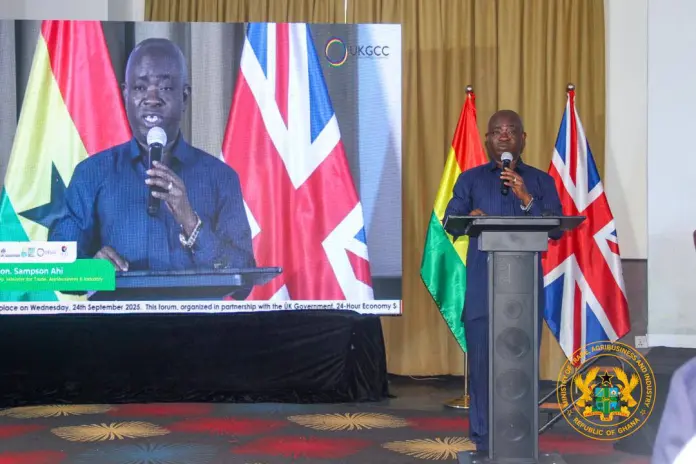By Ghana News
Copyright ghanamma

Ghana has intensified efforts to attract British investment through its transformative 24-Hour Economy initiative, with Deputy Trade Minister Sampson Ahi positioning the country as a strategic regional hub for agribusiness, industrialization, and export-led growth during the UK-Ghana Trade and Investment Forum in Accra.
Addressing government officials, investors, and business leaders, Ahi emphasized that Ghana seeks partnerships rather than traditional investment relationships. “Ghana does not simply seek investors; we seek partners, partners who will create jobs, transfer technology, and build capacity alongside us,” the Deputy Minister for Trade, Agribusiness and Industry declared.
The forum highlighted specific investment opportunities in agro-processing, pharmaceuticals, textiles and garments, machinery, and Ghana’s rapidly expanding automotive sector, presenting British businesses with entry points into one of West Africa’s most stable economies with significant growth potential.
Ahi stressed that British expertise in food technology, logistics, and standards compliance could prove pivotal in transforming Ghana’s traditional commodity exports including cocoa, cashew, and fruits into globally competitive value-added industries capable of commanding premium international prices.
The 24-Hour Economy framework serves as Ghana’s primary investment attraction platform, designed to maximize industrial productivity through continuous operations while creating employment opportunities and enhancing export competitiveness across multiple sectors simultaneously.
“The 24-Hour Economy provides the platform, our strategic entry points provide the pathways, and our shared commitment to innovation and trade provides the guarantee of success,” Ahi noted, emphasizing the comprehensive nature of Ghana’s economic transformation strategy.
Ghana’s geographic advantages include strategic positioning as a West African gateway, preferential trade access through the African Growth and Opportunity Act (AGOA) and European Union Economic Partnership Agreement, plus hosting the African Continental Free Trade Area (AfCFTA) Secretariat in Accra, creating unique market access opportunities.
The Deputy Minister highlighted ongoing business climate reforms aimed at reducing operational costs, streamlining regulatory processes, and enhancing Ghana’s appeal as a long-term investment destination capable of supporting sustainable business growth and expansion across regional markets.
While acknowledging the longstanding UK-Ghana trade relationship built primarily on raw commodity exchanges, Ahi stressed that future collaboration must prioritize industrial capacity development and value addition rather than continuing traditional export patterns that limit economic benefits.
Recent strategic partnerships demonstrate growing UK interest in Ghana’s economic potential. His Majesty’s Trade Commissioner for Africa, John Humphrey, recently concluded a three-day visit to Ghana focused on deepening trade and investment partnerships across mining, healthcare, and the 24-Hour Economy sectors.
The forum occurs as both countries seek expanded trade flows and strengthened supply chains amid global economic uncertainties. Ghana’s commitment to industrial transformation aligns with UK interests in accessing growing African markets while supporting sustainable development initiatives across the continent.
Investment opportunities span multiple sectors with particular emphasis on agribusiness value chains that could transform Ghana from raw material exporter to processed goods producer. British companies possess technical expertise and capital resources that align with Ghana’s industrialization objectives and export diversification goals.
The pharmaceutical sector presents significant opportunities given Ghana’s position as a regional healthcare hub and growing domestic market for medical products. British pharmaceutical companies could leverage Ghana’s strategic location to serve broader West African markets through local manufacturing and distribution networks.
Textile and garment manufacturing represents another priority area where British technical expertise could revitalize existing industrial capacity while creating new employment opportunities. The sector benefits from preferential trade access to both US and European markets through existing trade agreements.
The automotive sector’s rapid expansion reflects Ghana’s emergence as a regional assembly and distribution hub for international vehicle manufacturers. British automotive companies could participate in this growth through partnerships, technical cooperation, and supply chain integration across West African markets.
Ghana’s emphasis on technology transfer and capacity building distinguishes its approach from traditional foreign investment models. The country seeks partnerships that develop local expertise while building sustainable industrial capacity capable of competing in global markets independently.
The AfCFTA Secretariat’s presence in Accra provides additional advantages for British companies seeking continental market access through Ghanaian operations. The free trade area creates opportunities for efficient distribution across Africa’s rapidly growing consumer markets from a single strategic location.
Reform initiatives targeting business climate improvements include regulatory streamlining, digital government services, and infrastructure development designed to reduce operational costs while enhancing productivity across all economic sectors participating in Ghana’s transformation agenda.



